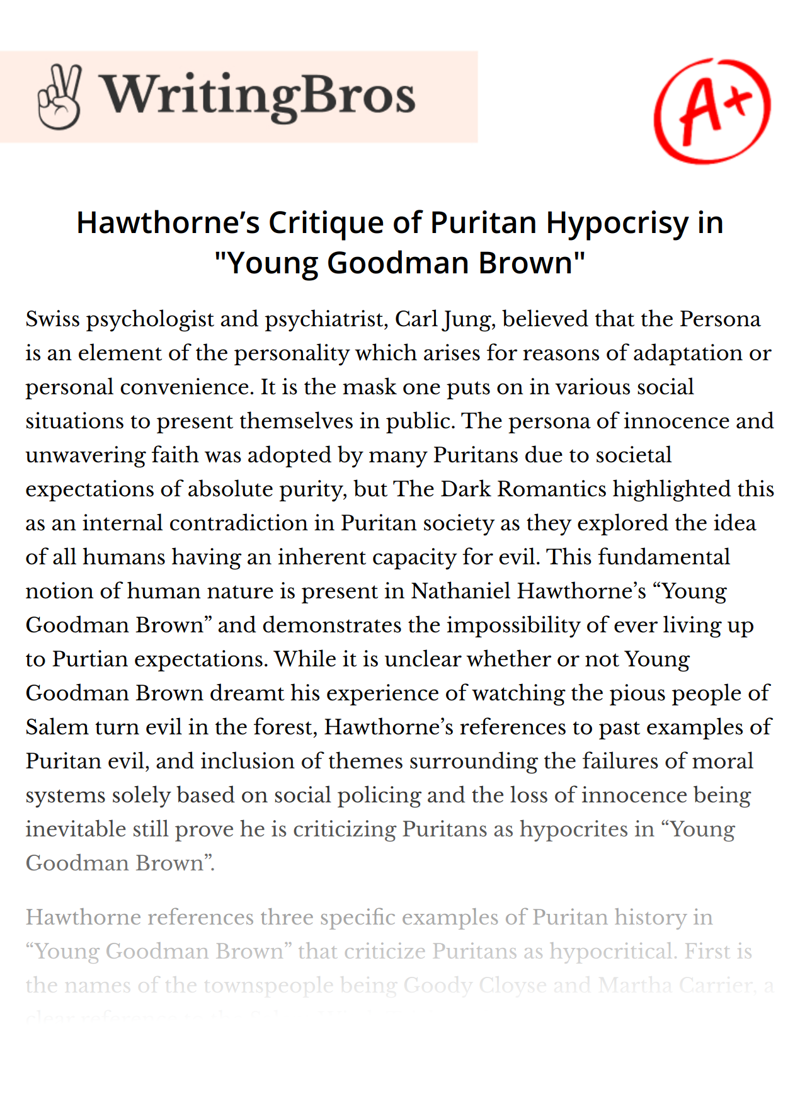Hawthorne’s Critique of Puritan Hypocrisy in "Young Goodman Brown"

Swiss psychologist and psychiatrist, Carl Jung, believed that the Persona is an element of the personality which arises for reasons of adaptation or personal convenience. It is the mask one puts on in various social situations to present themselves in public. The persona of innocence and unwavering faith was adopted by many Puritans due to societal expectations of absolute purity, but The Dark Romantics highlighted this as an internal contradiction in Puritan society as they explored the idea of all humans having an inherent capacity for evil. This fundamental notion of human nature is present in Nathaniel Hawthorne’s “Young Goodman Brown” and demonstrates the impossibility of ever living up to Purtian expectations. While it is unclear whether or not Young Goodman Brown dreamt his experience of watching the pious people of Salem turn evil in the forest, Hawthorne’s references to past examples of Puritan evil, and inclusion of themes surrounding the failures of moral systems solely based on social policing and the loss of innocence being inevitable still prove he is criticizing Puritans as hypocrites in “Young Goodman Brown”.
Hawthorne references three specific examples of Puritan history in “Young Goodman Brown” that criticize Puritans as hypocritical. First is the names of the townspeople being Goody Cloyse and Martha Carrier, a clear reference to the Salem Witch Trials as these people were victims of the false accusations. The references to the Salem Witch Trials criticizes Puritan hypocrisy because innocent people were accused based on jealousy and revenge. The second reference is to Puritan intolerance of the Quakers, “I helped your grandfather, the constable, when he lashed the Quaker woman so smartly through the streets of Salem” (2). This is another example of Puritan hypocrisy because while initially both groups settled in america to find religious freedom, soon Puritans began banishing Quakers from their towns and imprisoned, or even hung people for being a Quaker. The third reference is to King Philip’s War, “And it was I that brought your father a pitch-pine knot, kindled at my own hearth, to set fire to an Indian village, in King Philip's War”(2). King Philip’s War was another example Purtian evil wherein colonists settled inNative land and then raided Indian villages if the natives retaliated. The references to these historical examples prove Hawthorne is criticizing the Puritan persona as being a hypocritical facade.
Hawthorne includes two specific themes in “Young Goodman Brown” to criticize Puritans as hypocritical. First is the flaws of moral systems solely based on social policing. When Goodman Brown Goodman decided to come into the forest his intention was to meet with the devil, however he still hides when he sees Deacon Gookin and Goody Cloyse, “But with your leave, friend, I shall take a cut through the woods until we have left this Christian woman behind. Being a stranger to you, she might ask whom I was consorting with and wither I was going” (3). This highlights how Goodman Brown isn’t as concerned with the fact that he is decided to meet with the devil, than he is about how is faith appears to other people. His gut reaction to hide in fear is proof that Goodman Brown’s moral foundations are based solely on the concern of whether people perceive him as pure. This kind of faith depends on other people’s views and judgements of others actions and places more importance on maintaining a pure public persona than having sound moral groundings which makes Puritan faith weak and hypocritical as is clear by the demise of Young Goodman Brown later in the story. The second theme that criticizes Puritan hypocrisy is the impossibility of absolute human purity. This is most clearly demonstrated when Goodman Brown finds his wife in the forest as she was supposed to be the purest of all characters. Moreover, Goodman Brown makes the active choice to meet with the devil. This demonstrates how his curiosity drove him to the forest and made his demise inevitable. It means the uncertainty surrounding whether the evil events of the night are real does not matter. If the events were a dream, then that is a clear indication of Goodman Brown’s inherent dark side as they come completely from his head. If the events were real, then Goodman Brown’s fate is brought upon him through his own curiosity. The idea that Goodman Brown’s loss of innocence was inevitable, whether the events of the night were real or a dream, means it is impossible to meet the expectations of Puritan society so the Puritan persona is hypocritical.
Although it unclear whether or not the townspeople in the story were actually evil hypocrites, Hawthorne’s references to historical examples of Puritan evil and inclusion of themes that demonstrate wavering faith and the impossibility of meeting Purtian expectations prove he is criticizing the hypocrisy of Purtian society. Instead of committing to always uphold the persona of pious and absolute innocence which is hypocritical due to its inherent impossibility, Puritan society would have benefitted from acknowledging the inevitability of what Carl Jung would call the shadow of the human psyche, or the traits they dislike and would rather ignore.
Cite this Essay
To export a reference to this article please select a referencing style below

